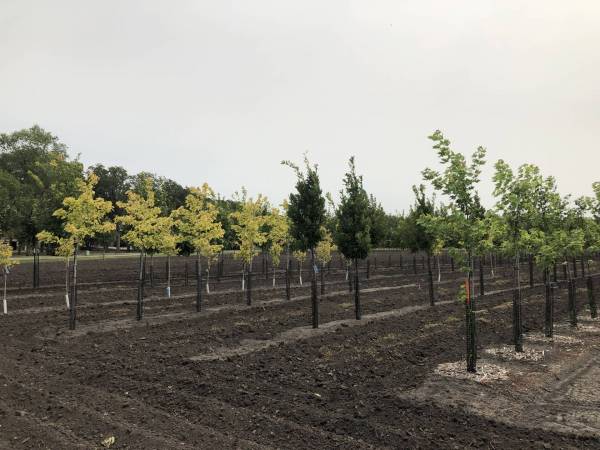
The North Dakota Department of Agriculture is responsible for administration of the nursery law (NDCC 4.1-22). The program ensures nursery stock being sold in North Dakota is practically free of damaging pests and diseases and assure consumers they are buying healthy, hardy, and quality nursery stock. NDDA also verifies compliance with various state and federal quarantines and regulations and helps nursery to meet requirements to ship outside of North Dakota into other states and countries.
Frequently Asked Questions
What is the North Dakota Nursery Program?
The North Dakota Nursery Program, administered by the North Dakota Department of Agriculture (NDDA), ensures that all nursery stock sold in the state is free from damaging pests and meets certain hardiness and viability standards. Nursery stock is defined as “trees, shrubs, and woody vines and any parts that a capable of propagation or growth except seed.” Only plants intended for outdoor planting are considered nursery stock. North Dakota nursery law is in Century Code 4.1-22 and administrative rules 7-04-02.
Why do I need a nursery license?
A nursery license is required to sell nursery stock in North Dakota to ensure compliance with state regulations that protect both consumers and the environment. The licensing process helps guarantee that nursery stock is sourced from inspected, certified growers, ensuring the plants are practically free from damaging pests and diseases. Additionally, it supports consumer protection standards by ensuring proper labeling, including plant hardiness and viability, and requires labeling of nonhardy plants. The program helps to prevent North Dakota from becoming a dumping ground for substandard nursery stock.
Who needs to be licensed under the Nursery Program?
Any individual, corporation, limited liability company, company, society, association, government agency, or other entity that sells nursery stock must obtain a license This includes garden centers, greenhouses, landscapers, and national multi-chain stores.
How do I apply for a nursery license?
You can apply for a nursery license online through the NDDA's website (ole.ndda.nd.gov). A step-by-step guide is available to assist you with the application process. A nursery license carries a $50 annual fee. All nursery licenses expire on December 31st of each year.
What are the inspection requirements for nursery growers?
Nursery growers are required to be inspected annually for pests and diseases. Certification of nursery stock is required for it to be offered for sale. Inspections are conducted between May and September, during the period of active growth. A grower may be propagating from seed, cuttings, or smaller sized nursery stock to increase the size for later sale.
What about the inspection requirements for nursery dealers?
Nursery stock at dealer locations is also inspected to verify compliance with federal quarantines, certification requirements, consumer protection standards, and to prevent plant pest introductions. A dealer may also be a grower. Dealer inspections are typically conducted in spring and occasionally in fall or winter.
What is the black stem rust quarantine?
The black stem rust quarantine, also known as the Barberry quarantine, prevents the introduction of barberry varieties susceptible to black stem rust (Puccinia graminis) of wheat. The NDDA enforces and monitors compliance with this quarantine.
What are the penalties for non-compliance with the Nursery Program regulations?
Violations may result in penalties up to $500 per incident. Repeated violations can lead to the denial of a nursery license.
How can I ensure that the nursery stock I purchase is hardy for North Dakota's climate?
Before purchasing nursery stock, consult with a trusted nursery dealer, horticulturist, or local extension agent to select plants that are adapted to North Dakota's climate and soils. The NDDA provides a list of non-hardy trees and shrubs that should be avoided. Non-hardy plants are required to be labeled “non-hardy in North Dakota” to be offered for sale.
Where can I find more information about the Nursery Program?
You can find more information on the NDDA's Nursery Program page. The page includes details on licensing, inspections, and compliance requirements. The website is https://www.ndda.nd.gov/divisions/plant-industries/nursery-program.
Apply For a Nursery License Online
A step-by-step guide may be found under Related Resources below.

